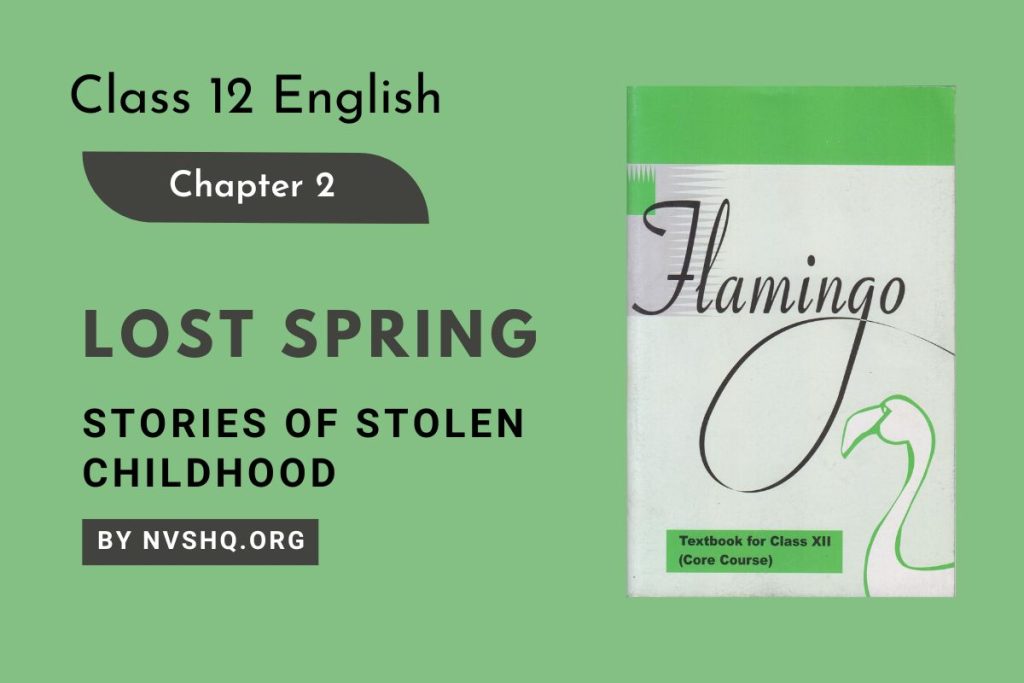Summary of The Lost Spring Class 12: The lost spring is the second chapter of English Reader Flamingo class 12. As the exam is nearing we have provided The Lost Spring Summary.

Lost Spring Summary Class 12 English
Lost Spring Stories of stolen childhood is written by Annes Jung. The writer has compared the spring season to the childhood stage of human development. As the spring season brings new flower into the trees similarly childhood is the spring season in which a child bloom and grow. The story is divided into two parts that are Sometimes I Find Rupees In Garbage and I Want To Drive A Car.
Both stories have different characters but explore the same theme which is poverty and child labour. The writer has given a peek into her own interaction with children who belong to deprived households and backgrounds. The author has made a comparison between the spring season and childhood and due to poverty and evil norms like child labour these children lose their innocence and childhood and hence the name Lost Spring.
The author describes her two interactions with two different children in two different stories. The first story Sometimes I Find Rupees In Garbage narrates the story of Shaheb-e-alam who is a rag picker. He is always in search of something in the garbage and when asked by the author why he doesn’t do anything else. To this Saheb replies that he doesn’t have anything else to do. When asked by the author why doesn’t he go to school Saheb replies that there is no school in his neighbourhood so how can he go? The author asks him if she will build a school and then if will he come there. The boy innocently replies to her that yes he will come.
After a few days when the author sees him, he comes to her and asks her whether her school is ready or not. The author replies that it takes longer to build the school. But she was embarrassed by herself that unknowingly she have made a promise to this young boy which she won’t be able to fulfil. But suddenly she realises that promises like these are often made to these poor kids which are never meant to be fulfilled. The chapter moves further and the author asks for the name of Saheb and then tells her that his name is Shaheb-e-alam then the author thinks about what would happen if he knows the true meaning of his name which is Master of the Universe.
The author has presented us with a bitter irony of life. The author calls the gang of these rag pickers an army of barefoot boys who were like morning birds. They used to come in the morning time and get disappeared afterwards. The author in her further interaction with these barefoot boys asks them why they are not wearing any chappals. To this one of them replies that his mother does not take it down from the shelf for him. To this, another kid who was wearing two different shoes replies that if still his mother take down the chappal from the shelf he still would throw it away.
The author amused by this kid asks him why he was wearing two different shoes to this kid only shrugs off. The third kid present over there just wishes to own a pair of shoes. Here author adds that these children are so innocent that being barefoot has become a justification for their poverty for them. The author goes on to narrate a story she heard from a man from Udipi as a young boy he used to pass a temple where his father was a priest and every time he used to wish for a pair of shoes.
Later after thirty years when the author visited that same temple she found a new priest in the temple and saw a boy in a school dress without a shoe and socks. The author comments that the wish of that kid has been granted and now every one of them is wearing shoes but those poor kids still live their life barefoot with no one to fulfil their wish. The tells her reader that Saheb was originally from Bangladesh but due to frequent storms their field and crops were destroyed and his family decided to shift to Semapuri, Delhi in 1971.
All of them were having a ration card not to have their identity but for the food, they will get. Food was more important for them than their own identity. The author further goes on to explain that for them garbage is gold. Their houses were made up of mud and plastic sheet roof with no proper drainage or running water. To the elders the garbage is gold but for the children, it is a treasure hunt where they can find treasure in the form of coins.
One day the author finds Saheb watching a game of tennis between two young men wearing tennis shoes which were given to him by some rich kid for whom the hole in the shoe was not acceptable but for kids like Saheb who went barefoot these shoes were a blessing and dream come true. The author ends the part when she finds Saheb with a steel canister. He informs her that now he works in a tea stall for 800 rupees and a free meal. When asked whether he likes his new job or not the author notices that the carefree look on Saheb’s face was lost he was no longer the master of his own will. His childhood was lost.
The second story I Want To Drive A Car is a story of Mukesh whose family generation is indulging in bangle making in Ferozabad. In his family, no members have learned any other skill rather than bangle-making. Due to bangle making they live under extremely dark conditions. Mukesh’s house is very cramped and dim. The condition in which Mukesh work is very severe because they work in darkness and some members of his family have even lost their eyesight at a very young age.
When the author talks to the grandmother of Mukesh she says that it is their destiny to do this work only and it is a God-given lineage which can’t be broken. The author gives a description of the condition of the house which was small and half-built. One girl Savita was closely looking at the process of bangle-making. Seeing her the author says that this girl does not realise that one day these bangles will signify her marriage.
The author further interacts with other family members and one of them reveals that he was only in the business of bangle making and due to it only he was able to make a house. The author comments that for him this is such a great achievement and how many are there who can’t even achieve this goal. The author asks them why they don’t organise them in a cooperative. They reply that the police, a middle man won’t allow us to do these things but actually the problem was they lack leadership qualities.
But Mukesh says that he wants to become a motor mechanic and whenever he gets a chance he will go and learn the skill in a garage. This story ends here. Mukesh still wants to follow his dream but Saheb lost his dream.
Also Check: My Mother at Sixty-Six Summary






